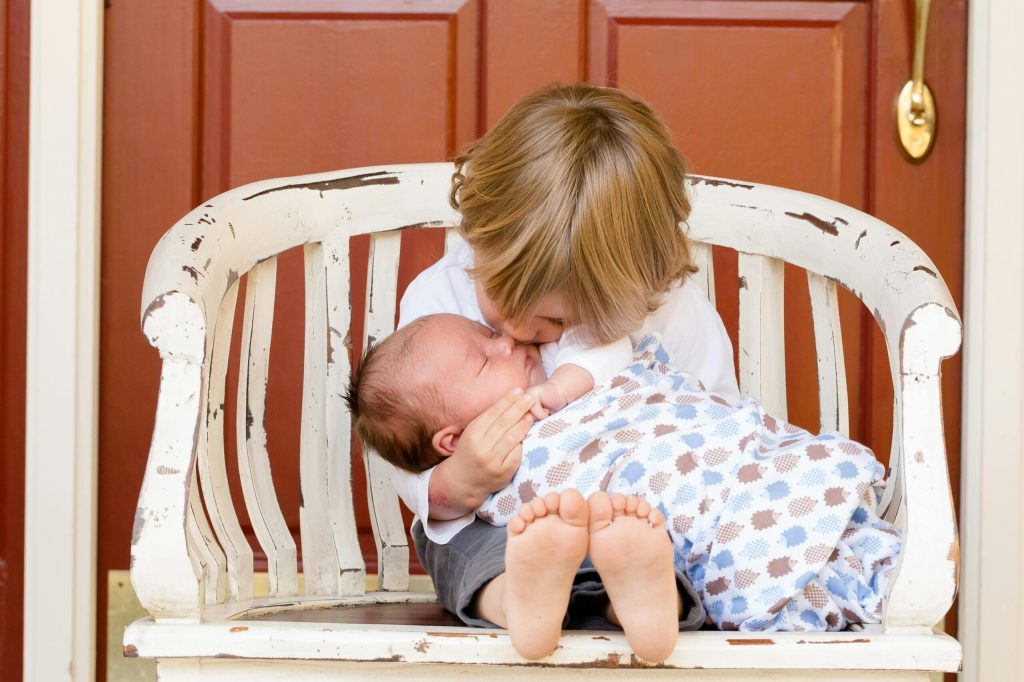Many are familiar with the narrative that middle children are neglected and excluded siblings. They are often seen as the ones who receive less attention from parents, are overshadowed by older siblings, and are not as pampered as the youngest. Thus, middle children have long been considered “forgotten” family members. But what if this stereotype is not entirely accurate?
Middle children often develop exceptional personality traits unique to their position in the family hierarchy. These traits, such as honesty, humility, and agreeableness, are not signs of neglect but make them stand out positively. Their upbringing, far from being overlooked, often fosters qualities that contribute to emotional intelligence, cooperation, and resilience. Recognizing and nurturing these unique strengths can empower parents and educators in their roles.
The Middle Child Stereotype and Its Origins
For generations, the middle child has been the subject of jokes and stereotypes, often portrayed as neglected, caught between the older sibling who gets all the attention and the younger one who is babied. This stereotype paints the middle child as the family’s “forgotten” member who must navigate life with less parental focus or indulgence.
But where did this idea come from? The origins of the middle child stereotype can be traced to early studies in family psychology and birth order theory. In the early 20th century, psychologist Alfred Adler popularized the idea that birth order could influence personality traits. He argued that middle children, feeling “squeezed” between their older and younger siblings, would often develop traits that make them more independent, competitive, and sometimes even rebellious.
Despite Adler’s theories, the stereotype of the middle child as neglected or overlooked has persisted in popular culture. Movies, books, and media often emphasize the struggles of the middle child in family dynamics, cementing the idea that they are the underdogs of the sibling group. However, real-life experiences usually differ from these portrayals. Many middle children report feeling just as loved and supported as their siblings, and in some cases, they find that their position in the family fosters unique strengths and perspectives.
The real challenge with the stereotype is that it overlooks the positive impact of complex family dynamics on a child’s personality. While some middle children may feel the pressure of competing for attention, others develop stronger relationships with their siblings and parents, cultivating a sense of empathy and cooperation. This understanding can bring hope and optimism to parents and educators.
Relevancy of the HEXACO Model to Middle Children

First, examining the science behind personality traits is essential to understand why middle children might be better people than their siblings. One engaging model used to measure personality is the HEXACO Personality Inventory. This model evaluates individuals across six key dimensions, providing a fascinating insight into the unique traits of middle children.
Studies show middle-aged children often score higher in honesty, humility, and agreeableness. The HEXACO model is particularly relevant to examining middle-aged children as it highlights these traits that are essential for understanding why they seem more grounded and cooperative than their older or younger siblings. The model’s focus on honesty, humility, and agreeableness aligns with the traits often associated with middle children, making it a valuable tool for understanding their unique personality development.
People who score high on this trait are known for their integrity and ethical behavior. They are not driven by selfishness or a desire for social status. Instead, they tend to avoid manipulation and remain sincere in their interactions.
Those who score highly agreeableness tend to be compassionate, forgiving, and cooperative. They are less likely to hold grudges and more likely to work well with others, even when faced with challenges.
Why Middle Children Are More Agreeable, Honest, and Humble
In many families, the oldest child receives the most attention from parents, as they are the firstborn and may be expected to take on more responsibility. On the other hand, the youngest child tends to be the “baby” of the family and is often doted on by parents and older siblings. This leaves the middle child in a unique position, neither the leader nor the baby.
As a result, middle children may develop more cooperative and self-sufficient behaviors to navigate the space between their older and younger siblings. They may learn to share attention, develop patience, and become skilled at conflict resolution.
The higher agreeableness observed in middle children can also be attributed to the need to cooperate with siblings, especially in larger families. Middle children often have to work harder to get their parents’ attention or avoid conflict so they may become more adept at compromise, empathy, and understanding other people’s perspectives.
Middle children may also be more humble because they often learn that competing with their siblings is less productive than finding ways to cooperate. As they grow up, they may be less inclined to seek out excessive attention or material rewards, focusing instead on being genuine and content with their position within the family.
The Science Behind the Traits of Middle Children
The unique personality traits of middle children are not coincidental. Research states that ” the birth order and family dynamics play a significant role in shaping these qualities.” The science behind these traits is rooted in psychological theories and studies that explore how siblings interact with each other and how their position within the family affects their behavior and development.
Birth Order and Personality Development
According to birth order theory, a concept first proposed by psychologist Alfred Adler, “The order in which a child is born can influence their personality. The firstborn is often seen as a natural leader, the youngest child as the ‘baby’ of the family, and the middle child as the one who has to carve out their identity. Middle children, in particular, are believed to develop specific characteristics in response to their position”.
Regarding personality, middle children may become more independent as they are not the primary focus of their parents’ attention. Still, they often find themselves between siblings, so they learn to cooperate and resolve conflicts. They are not just trying to stand out like the eldest or gain attention like the youngest; they seek balance and harmony within the family, which can lead to heightened agreeableness.
Research on Larger Families
Recent studies support that middle children’s traits become even more pronounced in more prominent families. Researchers asserted, “When there are more siblings, the need for cooperation becomes more significant.” Middle children in larger families often display greater agreeableness and empathy, as they are frequently called upon to mediate between siblings or share limited resources.
A key finding from research by Michael Ashton and Kibeom Lee, authors of the study on personality traits using the HEXACO model, was that “Middle-aged children who grew up in large families scored higher on honesty and humility than their older or younger siblings.” These results suggest that middle-aged children may develop a greater sense of fairness and emotional intelligence because they must navigate complex family dynamics.
The Development of Empathy and Emotional Intelligence
These dynamics may result in middle children developing better emotional intelligence, including self-awareness, self-regulation, and empathy. Their experiences in a family where attention is more divided can teach them to understand and respond more effectively to others’ emotions.
Practical Tips for the Strengths of Middle Children

- Encourage Cooperation and Conflict Resolution: Middle children are often skilled at conflict resolution due to their role in mediating disputes between older and younger siblings. This ability to remain calm, compromise, and find common ground can be a significant asset in the workplace or any group setting. By embracing these cooperative skills, middle children can become natural leaders in team-based environments, fostering collaboration and creating harmonious work relationships.
- Embrace Humility and Integrity: Middle children’s humble nature means they are less likely to be driven by vanity or material gain. This trait can be a significant strength when building meaningful relationships and establishing trust with others. By embracing their innate honesty and integrity, middle children can become reliable and respected figures in both personal and professional spheres.
- Develop Emotional Intelligence for Better Relationships: Growing up with the need to navigate family dynamics has likely enhanced middle children’s emotional intelligence. These children can use this emotional awareness to develop more profound, empathetic relationships. By practicing active listening, understanding others’ perspectives, and managing their emotions, middle children can form stronger connections with people in their personal and professional lives.
- Build Leadership Skills While Encouraging Collaboration: Middle children’s ability to cooperate and compromise makes them well-suited for leadership roles that require teamwork. They should focus on honing their leadership skills by facilitating group discussions, encouraging participation, and emphasizing collaboration over competition.
- Using Emotional Intelligence to Resolve Conflicts
Middle children can use their emotional intelligence to navigate challenging situations. Understanding and managing emotions can help them resolve conflicts peacefully and ensure that all parties feel heard and valued, whether at work or in personal relationships.
Middle Children as Balanced and Brilliant Individuals
The idea that middle children are neglected or overlooked is a stereotype that fails to capture the full complexity of their personalities. Research suggests that middle children often possess honesty, humility, and agreeableness traits that make them better people and valuable assets in their personal and professional lives.
Growing up in the middle of the family hierarchy presents unique challenges, but it also cultivates a cooperative spirit, a strong sense of empathy, and an ability to mediate conflict. These experiences can shape middle children into individuals who are more emotionally intelligent, honest, and willing to compromise for the greater good. Their position in the family may help them develop skills that enhance their relationships and make them more well-rounded individuals.
Rather than seeing themselves as the “forgotten” sibling, middle children should take pride in the personality traits they have honed over the years. By embracing their strengths, cooperation, humility, and emotional intelligence, they can grow into even better versions of themselves, bringing balance and harmony to the world around them.


